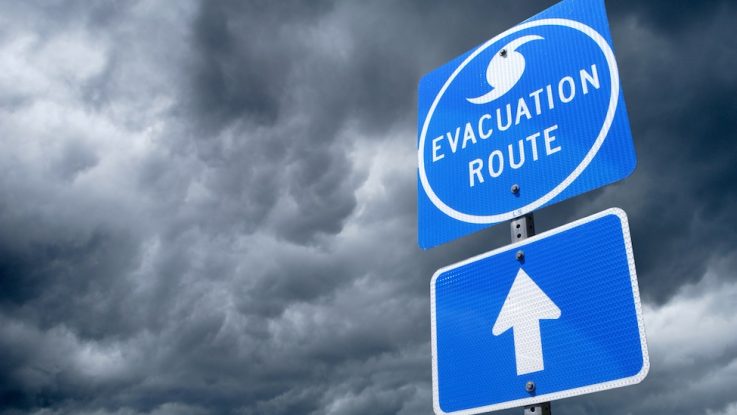
Are you prepared for an emergency while RVing? Whether you are evacuating a hurricane, wildfire, flood or something else, make sure to read FMCA’s tips to prepare yourself for emergencies and natural disasters while RVing.
Evacuation Safety
Prepare two escape plans.
- A plan on how to abandon the RV when you need to get yourself and occupants out safely.
- The other is a plan for packing/driving the RV away when time allows you to evacuate ahead of a wildfire, hurricane, or other threatening situation.
Pro-Tip: When prepping for emergencies, consider other factors that may affect your travel, such as weather. High winds could lead to wildfires and a need to prep for fire safety. Cold weather could lead to breakdowns.
RV Emergency Escape Plan #1
In the first instance, have a plan for escaping the RV in a variety of scenarios (galley fire, engine fire, RV lying on its side or roof). What is the quickest way to escape? How will you make sure all occupants are accounted for? Will one specific person be in charge of helping pets get to safety?
In boating, a “ditch bag” is kept handy to grab just before one abandons ship into the water or a life raft. Prep your own “ditch bag” to grab in case of RV disaster.
Pro-Tip: In your grab-and-go bag, consider including copies of important documents such as insurance policies, driver’s licenses, phone numbers, and credit cards.
RV Emergency Escape Plan #2
In the second instance, consider how you would need to evacuate the RV from a location.
A few points to think about as you form your plan:
- How would you handle removing the electric, water, and sewer hookups?
- If you drive a motorhome, consider if you’d have time to connect the towed vehicle.
- How long does it take you to retract the awning(s), slide-out(s), and leveling jacks for a quick getaway?
- If you or your driving partner is incapacitated, can the other person safely pack up the RV and drive you to safety?
- Do you have a reliable AM/FM radio or weather radio to stay informed of the latest weather or road condition updates? Remember that you may lose internet connectivity in an emergency or extreme weather situation.
- Do you have a Plan B for dealing with unexpected delays such as a stuck slide-out or sticky awning?
Consider making an “evacuation checklist.” Decide what items absolutely must be taken care of before you can safely move the RV and what can be eliminated, sped up, or modified.
Pro-Tip: On your evacuation checklist, list a family member or friend that you could call to let them know your emergency evacuation plans. This person can then alert other loved ones that you have safely evacuated.
You can’t predict the future, but you can help prepare yourself and your family by thinking about “What if?”
Have you ever found yourself in an emergency situation while RVing? What does your family’s emergency plan look like? Comment below.


Leave a Reply